For the fourth time, the German Program at UNCG partnered with the German Information Center of the German 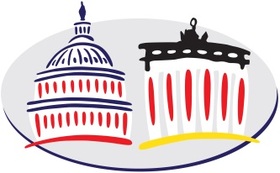 Embassy on their annual German Campus Weeks. This year’s theme was “Germany Meets the U.S.” Thanks to a grant from the German Embassy, we were able to host a number of events, including a film screening, Campus Competitions, and a one-day symposium.
Embassy on their annual German Campus Weeks. This year’s theme was “Germany Meets the U.S.” Thanks to a grant from the German Embassy, we were able to host a number of events, including a film screening, Campus Competitions, and a one-day symposium.
The symposium titled “Germany Meets the U.S.: Is the Transatlantic Relationship Still Relevant?” took place on Friday, November 4, 2016. UNCG Alumni and scholars from UNCG as well as from other institutions near and far shared their research on the historical and contemporary significance and relevance of the Germany-U.S. relationship.
The symposium began with an alumni panel discussing the value of German Studies. Two UNCG alumni presented on the role of studying German language and culture in their lives and on their international and transatlantic experience. An unintended red thread throughout the panel was that of serendipity. AdriAnne Cole Curtis (UNCG ’08) presented on her serendipitous path from a presumed future in the medical field to her current role as a German Teacher at Thornton Academy in Saco, ME. Her experience in the German program and tutoring students of German while at UNCG were formative moments in the development of her career path. John R. Young III (UNCG ’08) discussed how learning German at UNCG helped lead to his decision to pursue a Masters of International Affairs with a concentration in Renewable Energy and Finance. Also of note was how the knowledge of the German language increases his marketability as he pursues a career in Clean Energy Policy.
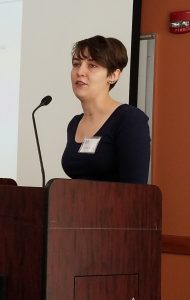
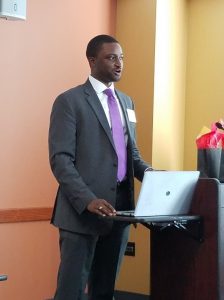
AdriAnne Cole Curtis (UNCG ’08) and John R. Young III (UNCG ’08)
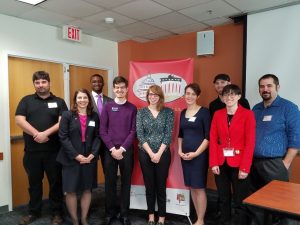
Alumni, Students, and German Program Faculty after the Alumni Panel
“Transatlantic Transfer: Historical Perspectives on the German-American Relationship”
The first of two afternoon panels, “Transatlantic Transfer: Historical Perspectives on the German-American Relationship,” explored institutional transfer and the transfer or appropriation of literary works. Dr. Emily Levine, Associate Professor of History at UNCG, presented on “What Germans and American Can Learn From Each Other in Education Reform.” Her talk discussed Wissenstransfer between the U.S. and Germany on the basis of the institution of the university. She argued that while the transfer of educational models was originally unilateral (Germany to U.S.), by 1900 the relationship became multilateral and precarious in nature owing to transatlantic collaboration and competition, based on competing local, national, and international goals. Dr. Lynne Tatlock, Professor of German at Washington University in St. Louis, presented a talk titled: “German Romance in American Translation in the Postbellum South.” Her presentation treated two American women translators from the south and why and what they translated from German in the aftermath of the Civil War. She argued that these women chose to translate specific texts that illustrated their own idea of Germany as a unified locale and a place of domestic harmony against the backdrop of a divided U.S.
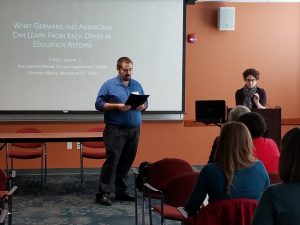
Dr. Benjamin Davis (moderator) and Dr. Emily Levine
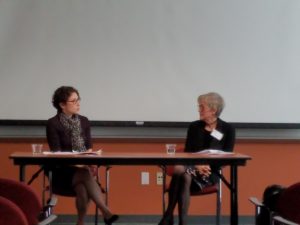
Dr. Emily Levine (left) and Dr. Lynne Tatlock (right) during the Question and Answer Session
“Diverse Communities? Questions of Race in a Transatlantic Context”
The second afternoon panel addressed the topic of “Diverse Communities? Questions of Race in a Transatlantic Context.” In her talk “Magical and Tragic Black Girl: Toxi and the Post-war Campaign for Black German Children,” Dr. Michelle Eley, Assistant Professor in the Department of Foreign Languages and Literatures at North Carolina State University, discussed how the film functioned to cultivate a certain image of the German family in relation to racial difference in the post-war era. Dr. Eley further provided information on the film’s socio-historical context that revealed a disparity between the orphan child’s situation in the film and the reality for most black children in post-war Germany. The second speaker on this panel, Dr. Faye Stewart, Associate Professor of German and Director of Undergraduate Studies in the Department of World Languages and Cultures at Georgia State University, gave a talk on “The Aesthetics of Death Penalty Abolition: Werner Herzog’s American Abyss.” Dr. Stewart investigated Herzog’s approach in this documentary, questioning why aspects of race were entirely omitted from his critique of incarceration and the death penalty in the United States.
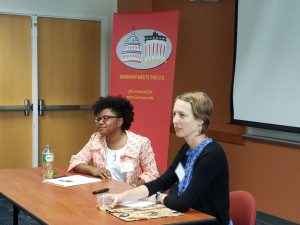
Dr. Michelle Eley (left) and Dr. Faye Stewart (right) during the Question and Answer Session

Panelists and attendees following the “Diverse Communities?” afternoon panel
Campus Competitions
UNCG German students actively participated in the day’s events. In addition to attending the panels throughout the day, a number of students presented posters they had created on the topic of “Meine Verbindung zu Deutschland” while other students gave speeches on their connection to German and Germany. The speeches were a particular highlight, as the students – who were initially terrified at the thought of giving a speech in German in such a public forum – felt empowered and a significant sense of accomplishment when they recognized that their German-language skills are indeed valuable beyond the German classroom.
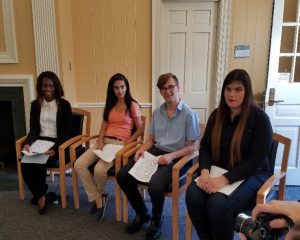

German Students preparing and presenting their Campus Competitions speeches
These activities also functioned as our “Campus Competitions” for the Germany Meets the U.S. Campus Weeks; hence, prizes were awarded to the top speeches and posters as determined by our audience as well as essays as determined by a committee of faculty members. Prizes were awarded at an awards ceremony held during our weekly Kaffeestunde and German Club meeting.
Top winners of the Campus Competitions were:
In the essay competition, Sydney Jarrard took first place for her essay on how her experiences as a fourteen-year-old in Germany and studying German at UNCG influenced her life and career goals.
Ben Tyson for his speech explaining the significance of soccer in German culture and consequently his own life after living in Germany.
Arin Liles for her creative comic strip depicting her connection to Germany.

Campus Competitions winners and German faculty at the awards ceremony
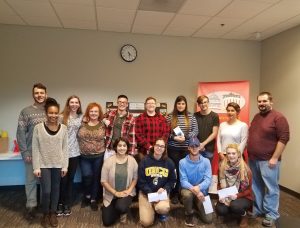
Campus Competitions participants and German faculty at the awards ceremony
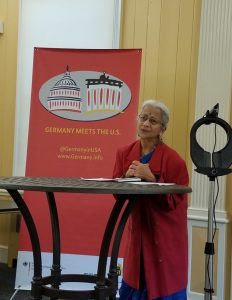
Keynote Speaker Dr. Kamakshi P. Murti
The keynote address was delivered by Dr. Kamakshi P. Murti, Professor Emerita of German at Middlebury College. Dr. Murti’s work has focused on ways to make the German Studies classroom a democratic, inclusive, and innovate space that takes on the pressing topics of our age. Her talk was titled “Counter-logical Spaces? Deliberative Dialogue as a Tool to Understanding Language’s Third Tongues.” She explained further that “Cultural difference gets articulated, says Homi Bhabha, in the ‘highly contradictory and ambivalent space of enunciation.’ Deliberative Dialogue is a useful pedagogical tool for creating these contradictory, counter-logical spaces, ‘where oppressed and oppressor are able to come together, free (maybe only momentarily) of oppression itself.’” On the example of a semester-long German Studies course she had taught, Dr. Murti detailed ways in which she employed Deliberative Dialogue to enable students to have the courage to voice values and beliefs that go against what mainstream culture holds to be politically or culturally correct. She emphasized the importance of Deliberative Dialogue as a means to democratize the ways in which students learn and knowledge is produced by requiring them to be actively involved in the process of engaging with course topics.

Dr. Brooke Kreitinger welcomes guests to keynote address
The symposium concluded with a reception following the keynote address. Guests enjoyed refreshments, toasted the German-American friendship, and continued discussions sparked by the day’s events.
A screening of the documentary Kings of Kallstadt offered a further opportunity to investigate the deep immigrant and economic ties between Germany and the U.S. The film was followed by a lively student-led discussion that addressed the depictions of the Heinz and Trump families, the extent of their connection to Germany and the U.S., as well as the depiction of village life in Germany.

UNCG Students and German Program faculty as well as friends from Guilford College at the screening of Kings of Kallstadt October 25, 2016